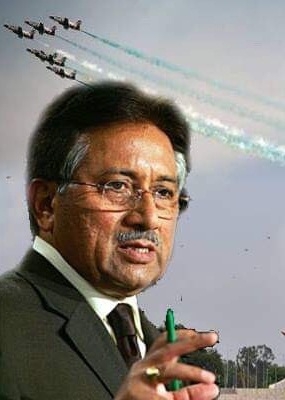HAMZA AMEER Islamabad, Feb 5 (IANS) Former Pakistan President and army chief Pervez Musharraf passed away on the early hours of Sunday after losing out to an extended battle with a rare health disease. The 79-year-old left behind him, a legacy of many misadventures. Musharraf served as Pakistan's army chief for about nine years from 1999 to 2008, during which, he overthrew the government of then Prime Minister Nawaz Sharif and declared a martial law in the country. Later, Musharraf became the 10th President of Pakistan in 2001 and remained on the position till early 2008. It is pertinent to note that Musharraf's selection as army chief was done by Sharif, who appointed Musharraf after ignoring many senior names in the list of candidates. Musharraf was born in pre-Partition Delhi on August 11, 1943. After partition, his family got settled in Karachi where he studied in Saint Patrick's school. Later, he joined the Pakistan Military Academy in Kakul, Abbottabad and graduated in 1964. Musharraf was part of the Indo-Pak war in 1965 as the elite Special Services Group (SSG). He was also part of the 1971 war with India, where he was the company commander of an SSC commando battalion. Musharraf gained fast promotions through several military assignments later on. In October 1998, he was appointed as the Chief of Army Staff (COAS) by the then premier Nawaz Sharif, who was later ousted off power by Musharraf in the 1999 military coup and became the country's president. Musharraf's tenure in power can he highlighted in many misadventures: 1999 Military Coup: On October 12, 1999, troops of Pakistan army took over the Prime Minster house in Islamabad after Nawaz Sharif prevented Musharraf's plane from landing at Karachi airport upon his arrival back from Sri Lanka. Musharraf got aware of the situation and declared a state of emergency in the country, suspending the Constitution assuming the role as the chief executive. It was seen as a bloodless coup as no organised protests were witnessed against the coup. Musharraf later became the President of Pakistan, retaining his position as the army chief as well. The 9/11 impact and Pakistan's allegiance: After the US announced an all out war against terrorists, announcing its military offensive in Afghanistan against Al-Qaeda and the Taliban; Musharraf agreed to become an ally to Washington in the war, which may be widely criticised but was openly defended by Musharraf on various occasions. Pakistan has started to get financial assistance from the US in the form of a Coalition Support Fund (CSF) to be used to fight against terror groups and elements on Pakistan soil and along the Pak-Afghan border. Along with it, Pakistan also started getting a considerable amount in the form of foreign exchange from the US, which also supported Musharraf's regime to initiate various development-level initiatives. However, the financial assistance of CSF from the US came with a set of demands to Pakistan, which included an operation at the Lal mosque, facilitation to NATO forces to fly their drones and planes from Pakistani airbases, permission to carry out drone strikes by using Pakistani airspace and targeting suspected terror installations inside Pakistan and to carry out military offensives anywhere and everywhere the US demanded on Pakistani soil. The Lal Mosque operation, which many believe became the boiling point of a major surge in terrorist offensive, suicide bombings and attacks on Pakistani security forces and the local at large, was one of the biggest misadventure undertaken by Musharraf on the directions of the US. Moreover, the Dera Bugti operation is also widely criticised by all of being forced into action despite offers for peace talks by the Bugti tribe leaders. Again, it was stated that the operation was done on the directives of the US. Musharraf's power stunt by penetrating and occupying high position in Kargil are also something that he claimed to be his success story, but was widely consumed as another misadventure, that later brought political embarrassment to the country. It was also reported that Musharraf, after the Kargil operation retreat, was pressurised by the US to not only call back his troops but also to take a step forward and extend a peace and friendship message towards India. It was because of the same pressure that Musharraf did that famous handshake with the then Indian Prime Minister Atal Bihari Vajpayee during the SAARC conference in Sri Lanka. The Musharraf legacy will certainly be written in bitter and sweet memory and as someone, who was strong-headed enough to commit misadventures of such grave intensity that they could trigger a nuclear war between India and Pakistan.
Musharraf - the era of misadventures
- by Rinku
- February 05, 2023 2 minutes

Former Pakistan army chief and president Pervez Musharraf.(photo:@P_Musharraf/Twitter)











